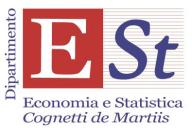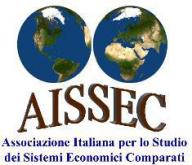By Maurizio Bussolo[1]
Some Recent Influential Work on Inequality
Economic inequality, defined as the unequal distribution of income and wealth among individuals and groups within a society, has been a persistent issue throughout history. In the recent decade, the study of economic inequality has gained renewed importance as economists and policymakers recognize its far-reaching implications for social and economic progress. This note explores the evolving perspectives on economic inequality over the past decade and examines potential developments for the next decade.
In the early 21st century, economic inequality was often viewed through the lens of market efficiency and individual responsibility. Traditional economic theories emphasized the role of free markets in promoting growth and prosperity, with less attention given to distributional outcomes. Over the past decade, there has been a significant shift towards inclusive growth, recognizing that high levels of inequality can undermine economic stability and social cohesion. Prominent studies include Joseph Stiglitz's "The Price of Inequality" (2012), Thomas Piketty's "Capital in the Twenty-First Century" (2014), Angus Deaton's "The Great Escape" (2013), Anthony Atkinson's "Inequality: What Can Be Done?" (2015), Branko Milanovic's "Global Inequality: A New Approach for the Age of Globalization" (2016), Emmanuel Saez and Gabriel Zucman's "The Triumph of Injustice" (2019), and Raj Chetty's papers on intergenerational mobility. These studies have profoundly shaped the understanding of economic inequality, highlighting its complex nature and the need for comprehensive, long-term solutions.
Four Main Themes of Recent Research
Inequality of Outcomes and Inequality of Opportunities
Inequality of outcomes, such as incomes and wealth, remains a central focus of economic research and policy discussions. International organizations like the IMF and the World Bank have taken a more active role in addressing inequality. The World Bank's new corporate scorecard focuses on reducing the number of countries with a Gini coefficient greater than 40. However, challenges remain in accurately measuring the incomes of the wealthy, leading to discrepancies in inequality estimates. Alvaredo, Bourguignon, Ferreira, and Lustig's study "Inequality Bands: Seventy-five years of measuring income inequality in Latin America" (forthcoming) sheds light on this issue. Alternative approaches, such as using house prices as a predictor of household incomes, have been explored by van der Weide et al. (2018) to provide a more comprehensive picture of income inequality.
In addition to inequality of outcomes, the concept of inequality of opportunity has gained prominence. This refers to the idea that life outcomes should not be determined by circumstances beyond an individual's control. The Global Estimates of Opportunity and Mobility (GEOM) database provides valuable insights into the extent to which individuals' outcomes are influenced by their circumstances. By focusing on both inequality of outcomes and opportunities, researchers and policymakers can develop more effective strategies to address the root causes of inequality and promote social mobility.
Impact(s) of Inequality
Recent research has highlighted the critical nature of inequality and its potential to hinder economic growth, lower the effectiveness of growth in poverty reduction, undermine social cohesion and mobility, and exacerbate insecurity and the crisis of the middle class. Studies such as Ferreira et al. (2017), Hsieh et al. (2019) and Marrero and Rodriguez (2013) point at the negative impacts of inequality of opportunity and misallocations on growth. Bourguignon (2003) shows that higher levels of inequality can reduce the effectiveness of economic growth in alleviating poverty and undermine social cohesion. The Great Gatsby curve, discussed by Corak (2012) and Krueger (2012), illustrates the relationship between inequality and intergenerational mobility, showing that higher inequality is associated with lower mobility. Additionally, economic insecurity has increased in European countries over the past decade, indicating a crisis of the middle class.
Global Inequality
Global inequality has significant implications for both economic and social dimensions worldwide. Globalization has led to increased awareness of income disparities across countries, influencing perceptions of fairness and equity. Theories of justice, such as utilitarianism and “Global Rawlsianism” (Kanbur 2015), provide frameworks for understanding the ethical implications of global inequality. Reducing inequality can enhance overall social welfare by increasing the utility of those with lower incomes and ensuring equal opportunities regardless of birthplace.
Political Economy of Inequality
In democratic societies, political mechanisms should inhibit or reverse large rises in inequality. The Meltzer-Richard model (1981) suggests that high inequality should lead to higher levels of taxes and redistribution. However, perceptions of inequality can differ significantly from economic definitions, influencing policy preferences. Alesina and Glaeser (2004) study differences in preferences for redistribution, Gimpelson and Treisman (2018) discuss the misperceptions of inequality, while Bussolo et al. (2021) examine how perceptions of inequality are formed. Additionally, the distinction between de jure and de facto control over government policies and institutions, as discussed by Acemoglu, Robinson (2013), can limit the extent of redistribution. Informal systems of redistribution and insurance also play a crucial role in mitigating inequality but can perpetuate certain social norms and inequalities. Rosenzweig and Stark (1989) and Bussolo and Dixit (2023) discuss how these systems can serve as informal insurance and redistribution mechanisms. Bachas et al. (2024) examine the impact of consumption taxes in economies with significant informal sectors.
The Future of Inequality Studies
The study of inequality will be shaped by three main factors: cross-fertilization with other fields, technological advancements, and the ongoing challenges posed by climate change and other global shocks. Interdisciplinary collaboration with fields such as psychology, sociology, political science, and geography can provide deeper insights into the factors driving inequality. The impact of technology, particularly AI and robotics, on inequality is a critical area of study, with automation potentially leading to job displacement and increased inequality, as explored by Acemoglu and Restrepo (2016, 2017) and Bandiera et al. (2022). Additionally, the accumulation of digital data can influence future trends of inequality, with disparities in access to technology and digital literacy perpetuating inequalities, as discussed by Öhman (2024).
Climate change and other shocks, such as the COVID-19 pandemic, have had and will continue to have significant implications for inequality. These events can exacerbate existing disparities and create new vulnerabilities, disproportionately impacting marginalized and low-income communities. By integrating insights from various fields and addressing the complex factors driving inequality, researchers and policymakers can develop more effective strategies to promote equity and social justice in the years to come.
[1] World Bank’s Chief Economist Office for South Asia,









